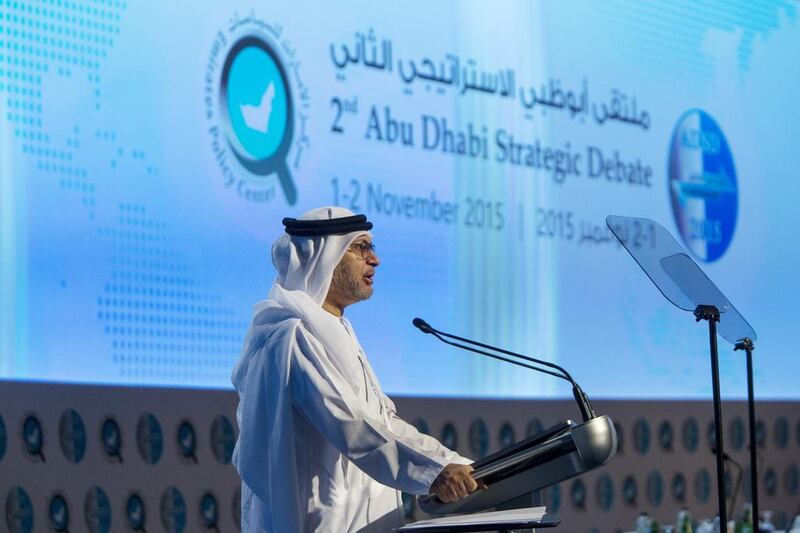ABU DHABI // The UAE will not tolerate Yemen becoming home to a Hizbollah-style Iranian-backed militia, the Minister of State for Foreign Affairs said on Sunday.
Dr Anwar Gargash said the UAE believed it was imperative that a peaceful solution to the conflict was found, one which respected the wishes of the Yemeni people and the legitimacy of the Yemeni government.
“For four decades Yemen was one of the biggest recipients of UAE aid,” Dr Gargash said at the opening of the Abu Dhabi Strategic Debate.
“Despite this help, Yemen has traditionally been unstable for reasons that go back centuries. What changed this year was the Iranian influence that led the Houthis to undermine the Yemeni government and degrade its institutions.”
The UAE has been part of the Saudi-led regional military coalition in Yemen since March tasked with safeguarding the Gulf’s security and stability, which the Houthi uprising threatened.
Since then, dozens of Emirati soldiers have been killed on the battlefield as terrorist groups continued to threaten the foundations of Arab states.
“Unfortunately, terrorism has found a warm incubator in our region,” Dr Gargash said. “With the support of entities which provide ideological weapons and finance, these closed-minded groups want to undermine Arab countries and break down the social fabric of our societies to promote their myopic view of the world.
“This danger is even greater than terrorism. Terrorists use Islam to justify their acts, tamper with our cultural heritage and brainwash our youth with false and subversive messages.”
The minister said the UAE’s decision to intervene in Yemen was prompted by this challenge. “We have always wanted Yemen to be a politically, economically and socially viable state and society,” he said. “But [the Houthis] effectively began to build a state within a state, and we could not allow this to happen right in our backyard. Instead, we have intervened to protect the region’s long-term security.”
The UAE has provided millions of dirhams in support to Yemen since the start of the conflict, renovating schools, rebuilding hospitals and providing food to hundreds of thousands of families.
“We will continue to provide humanitarian assistance and relief to the Yemeni people while helping to foster the development of viable, effective state institutions in the country,” Dr Gargash said.
“The liberation of Aden following the Houthi carnage has effectively allowed us to provide such support. You can be assured that the UAE, with its partners, will use this opportunity to continue in our common efforts to alleviate the suffering of the Yemeni people.”
He said Al Qaeda’s presence in Yemen would also be addressed.
“Our soldiers have twice been hit by Al Qaeda attacks in Aden because terrorists know that our strategy there will ultimately destroy them,” he said. “The terrorists want anarchy but they will not stop us from enabling the Yemeni government from exercising its authority from Aden. They will not stop us, no matter how hard they try.”
Analysts said the regional situation was critical.
“We have non-state actors that work under foreign agendas and they were able to complicate the regional scene with their own agendas,” said Jasim Al Khalufi, head of Arab affairs at the Ministry of Foreign Affairs.
“We also have issues like sectarianism and ethnic problems prevailing over countries’ interests.”
Others said regional conflicts that affected major Arab countries, such as Egypt, Iraq and Syria, created more responsibility for GCC countries.
“While GCC countries depended in the past on the power and strategic depth of these countries to protect the Arab regional system and GCC security against the threat of other [groups], they have now become influential regional and global actors that other Arab countries can turn to for resolving crises and restoring stability,” said Dr Ebtisam Al Ketbi, chairwoman of the Emirates Policy Centre, which organised the event.
“The world is changing in rapid and irregular ways and that comes in the form of shocks that are hard to analyse and understand. This makes it more difficult to predict changes, events and developments.”
cmalek@thenational.ae






